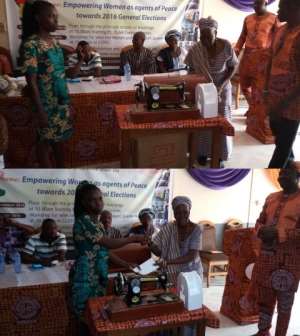
The Council for Technical and Vocational Education and Training (COTVET) has lauded government's decision to realign all aspects of Technical and Vocational Education and Training (TVET) under the Ministry of Education to strengthen skills development.
Dr Fred Asamoah, the Executive Director of TVET, said Ghana needed to develop a robust and functional TVET system to improve the productivity and competitiveness of the skilled workforce in the country.
Dr Asamoah was the Guest Speaker at the Fifth Graduation and Second Best Staff Award Ceremony of the Biriwa Vocational Training and Rehabilitation Institute in the Central Region at the weekend.
The day, which was celebrated on the theme: "Quality TVET: A Tool for Ghana's Rapid Industrialisation Growth,' offered the graduands the opportunity to showcase some of their products to the public.
A total of 153 students graduated, some of whom did four years of training in Block Laying and Concreting, Carpentry and Joinery, General Electrical, Catering and Dressmaking.
The others include Leather Works, Welding and Fabrication, Motor Vehicle Mechanics, Refrigeration and Air-Conditioning as well as Generic Skills for Sustainable Livelihood.
Dr Asamoah technical and vocational training could be achieved with well resourced institutions to provide quality oriented, industry focused and competency based training programmes as well as other complementary services.
He noted that skills training was critical in national development and had enormous potential for moving the country's economy forward but little had been done in that sector.
He noted that while Ghana could be said to have done well with education in humanities, TVET was still lagging behind and called on the Government to commit more resources to it.
'It is widely accepted that TVET has the potential to accelerate a country's drive towards rapid industrialisation growth in the sense that competent craftsmen and technicians are well trained.
'This will be helpful during the implementation of the Government's One District, One Factory Programme,' Mr Asamoah said.
Mrs Mawusi Nudekor Awitey, the Executive Director of the National Vocation Training Institute (NVTI), stressed the need for Ghana to make a paradigm shift in its economic structure towards one that hinged on expanding natural resources in their raw form to value addition.
She said it was urgent for TVET providers to have the needed tools and equipment, adequate training materials and well qualified trainers to be able to provide relevant skills necessary for enhancing economic performance.
Mr Samuel Kwashie Amegbor, the Institute Manager, said since its establishment in 1974, the Institute had trained more than 6,500 local and international students in various vocational and technical disciplines and were excelling in their field of specialty globally.
He advocated for a strong TVET front in Ghana as the job market had huge shortage of high and semi-skilled labour, which was expected to be filled by TVET.
Mr Amegbor called on the Government and other stakeholders to help the Institute address its problem of inadequate residential accommodation, infrastructure, tool and equipment for students and staff.
He mentioned the absence of official vehicles, power plant and assembly hall, and poor road networks on campus as other challenges facing the Institute.
The challenges, he said, hindered the Institute in carrying out its mandate of training the youth in quality employable skills to meet the demands of 21st century job market.
GNA
By Afedzi Abdullah, GNA




 Ghana will make maiden voyage into space should Bawumia become President — Chair...
Ghana will make maiden voyage into space should Bawumia become President — Chair...
 Train crash: Despite the sabotage, we shall not be deterred and will persevere —...
Train crash: Despite the sabotage, we shall not be deterred and will persevere —...
 Tema-Mpakadan railway project a perversion of the original viable concept design...
Tema-Mpakadan railway project a perversion of the original viable concept design...
 Train crash: Elsewhere, everyone involved in the test will either be fired or re...
Train crash: Elsewhere, everyone involved in the test will either be fired or re...
 Ghana, other election bound-countries must build fiscal buffers – IMF admonishes
Ghana, other election bound-countries must build fiscal buffers – IMF admonishes
 Parliament reconvenes late May, denies Speaker Bagbin delaying recall over NDC t...
Parliament reconvenes late May, denies Speaker Bagbin delaying recall over NDC t...
 $100m needed to revitalise Ghana's poultry sector — GNAPF
$100m needed to revitalise Ghana's poultry sector — GNAPF
 Driver arrested for causing train collision on Tema-Mpakadan Railway Line
Driver arrested for causing train collision on Tema-Mpakadan Railway Line
 Police grab trucker for Tema-Mpakadan rail accident
Police grab trucker for Tema-Mpakadan rail accident
 Gov't plans to revise traditional customs following Gborbu child marriage
Gov't plans to revise traditional customs following Gborbu child marriage
